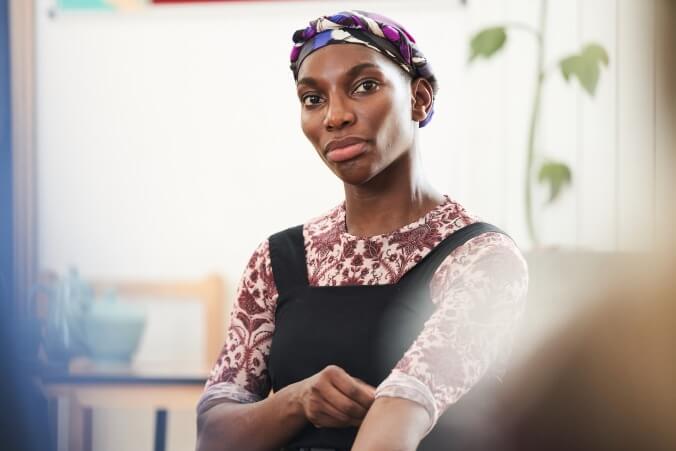We need victimhood to be this perfect thing, don’t we? So far, Arabella, Kwame and Terry have all been “perfect” victims. Their attacks were all examples of crimes perpetrated by strangers and there’s little that gets in the way of the audience feeling sympathy for them. In reality, victimhood is not this simple. Victims can be imperfect and still be worthy of support and well-being. “The Alliance” is the story of an imperfect victim. It’s a complicated episode and it’s also another welcomed departure from Arabella’s story. I May Destroy You isn’t in a rush to unlock Arabella’s journey.
It also wouldn’t be fair to say the show is just about Arabella’s healing process anymore. Terry and Arabella don’t know what happened to Kwame, but we know why he’s so dedicated to painting in the opening. Terry is being protective and trying to follow best practices, but Arabella isn’t able to connect with her. I do think Terry is right about the situation though. Arabella is distracting herself with her phone and she does seem vacant. At the same time, a list of self-help activities isn’t going to force her to be herself again. “You need to be around people who affirm you,” Terry says. She’s also right about that too, but Arabella needs more than just Terry and Kwame to be around.
I’m happy we get to see Arabella in group therapy. I May Destroy You does a great job of crafting a realistic and helpful space for survivors. This isn’t the typical survivor narrative where a woman is forced to struggle alone in her sorrow. Arabella gets to sit in a room with other women who also just hate abusers and need to process what happened to them out loud. It’s hard to find spaces to do that when you’re healing in public. Arabella, for example, has become a poster child for various sexual assault hashtags, according to Terry. While this elevation may help her feel better as she processes her assault, it also puts her words under additional scrutiny.
Suddenly, she speaks for all survivors, which can’t make it easy for her to process anything. In Theo’s group, we finally hear Arabella share thoughts we haven’t heard before and understand the intimate context applied. She’s there “to learn how to avoid being raped.” Of course, that isn’t possible, but at this stage of her healing process, Arabella needs to believe that’s possible. She needs to believe she has some control over these events and this couldn’t just happen at any time. Arabella still doesn’t feel like she has control, even if she is painting and gaining followers online.
It’s fitting then that Michaela Coel’s script takes control of the story away from Arabella after that. We go back in time to the early-2000s when Theo, Terry and Arabella went to school together and find out why Terry was so skeptical of Theo. Theo is an imperfect victim. In her opening monologue, she says that she hates abuse, grooming, exploitation and assault. She uses these specific terms because she has been harmed in various ways. Her mother exploited and forced her to imagine horrific acts at a young age. She learned to weaponize sex. When she realizes Ryan and his friends have been sharing photos of her, she knows she can get away with it. Also, she whispers some racist stuff under her breath when her mother is walking her away from the school.
Of course, this is a high school, but it’s interesting to compare the Ryan’s “interrogation” and the windows of the principal’s office with the rooms Kwame and Bella had to sit in. In Ryan’s case, everything seems clear as day. There are large open windows. Initially, there is no question here. Ryan is told the police have already been called. Terry and Bella are right: white girl tears have high currency. Terry and Bella wouldn’t have gotten the same treatment, either. Black women are seen as aggressive and aren’t easily seen as victims. Terry’s lingering resentment towards Theo most likely stems from that double standard. Bella is now able to look back and understand the ways that Theo was abused in the situation.
Terry and Bella save the day and are celebrated by “The Alliance.” But then you remember it was two black men who left Arabella alone the night she was assaulted. Would any of these boys have helped Arabella or Terry if they needed it? Probably not, yet they’re quick to use Arabella and Terry to clear themselves of wrongdoing, even though it was still wrong of them to share photos of an underage girl. In group therapy, Arabella and Theo can see the similarities they share. Hopefully, Arabella sticks with it. I think it’ll have a better pay off than social media.
Stray Observations
- There have been hints since the pilot, but Arabella is a really bad friend. Twice, she says really mean things to Terry when they’re in school. Terry wants to start TerryTV, Bella calls her ugly. She also insults her in the bathroom. This dynamic is more blatant when they’re both kids fighting for attention.
- I really need Kwame to talk to someone.
- I love that Terry is trying so hard, but I think she just feels guilty.
- “But, I’m lovely, I promise.” – I love Theo’s introduction.









































